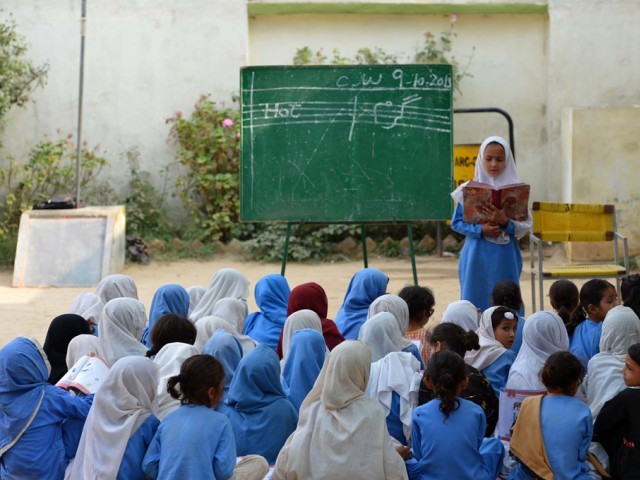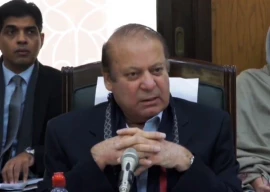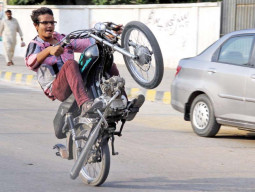
ISLAMABAD: Around 20 per cent of the country’s children are out of school, while reducing the gender disparity is still a long way off, as only 43 per cent of students between the ages of five and 16 are girls.
Of the total girls enrolled, around 42 per cent in rural Pakistan can read a sentence of Urdu, Sindhi and Pashto from grade one to grade five, while 43 per cent can read English words, and around 41 per cent can do basic arithmetic.

Although boys performed a bit better than girls, the were still subpar, with around 49 per cent being able to read any of the three local languages, 51 per cent able to read a sentence in English, and 49 percent able to do simple arithmetic.
The Annual Status of Education Report –ASER 2015 unveiled the figures on Thursday at the Planning Commission. The report only details rural areas.
An official who worked on the report said it was because the National Bureau of Statistics could not provide mapping and other household data to ASER in time.
The report adds that about 98 per cent of children in Islamabad Capital Territory are enrolled in schools.
“Despite the recent focus of the federal and provincial governments on enrolment drives as a rhetoric on Article 25-A, 20 per cent of Pakistan’s children aged 6-16 still remain out of school,” reads the press release from ASER. It further adds that the remaining 80 per cent that are enrolled in the 6-16 age bracket are not learning much either.
For the year 2015, the ASER rural survey has been conducted in 146 rural districts and 21 urban administrative areas in the country. They further stated that urban findings will be released afterwards at the provincial launches.
Talking about Balochistan, Senator Mir Hasil Khan Bizenjo said they would need around 8,000 more schools to enrol every out-of-school child in the province. He further added it was because of government apathy towards public schools that students were joining seminaries. To this, Baela Raza Jamil from Idara-e-Taleem-o-Aagahi (ITA) commented that the number of children going to religious schools was decreasing, according to their data. Jamil added that the numbers in Balochistan were stark, but they had improved compared to previous year.

The report criticises the implementation of Article 25-A of the Constitution as both laws and rules remain in abeyance.
The report findings suggest that proportion of out-of-school children has decreased compared to 2014. In 2015, 20 per cent of children were reported to be out-of-school which has decreased as compared to previous year (21 per cent). Similarly, around 14 per cent children have never been enrolled in school and six per cent have dropped out of school for various reasons.
Public-private gap
The survey also has identified that children enrolled in private schools are performing better compared to those studying in government schools as 67 per cent children enrolled in grade five in private schools were able to read a story in the three languages (Urdu, Sindhi, Pashto) compared to 52 per cent of grade five students of government schools. The difference in learning levels was starker for English, where 65 per cent from grade five could read English of grade two sentences compared to only 45 per cent public sector students.
Teacher’s attendance
The rural survey reports that over all teachers’ attendance in government schools stood at 89 per cent as compared to 91 per cent in private schools on the day of the survey. Private teachers were reported to have better qualifications at graduate levels. For example, 39 per cent teachers in private schools are graduates in comparison to only 35 per cent in government schools, however the reverse is the case for MA/MSC or post graduate qualifications, whereby larger percentage of public sector teachers have a higher qualification than private sector counterparts.
Published in The Express Tribune, December 18th, 2015.











































COMMENTS
Comments are moderated and generally will be posted if they are on-topic and not abusive.
For more information, please see our Comments FAQ